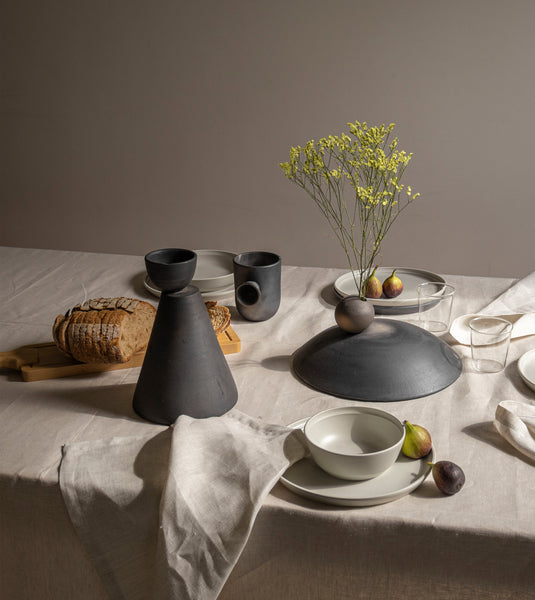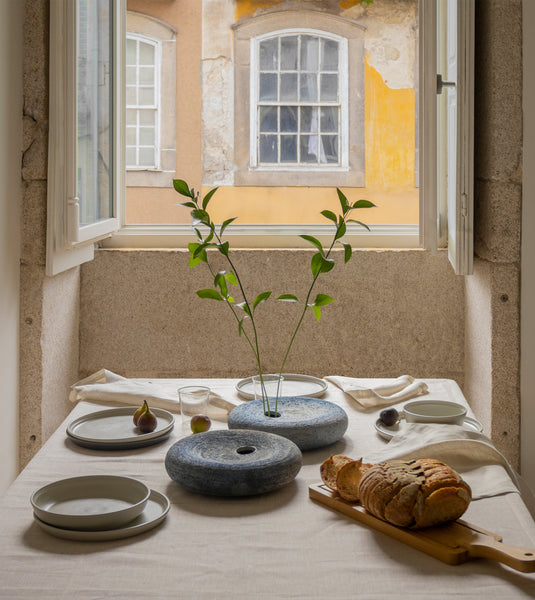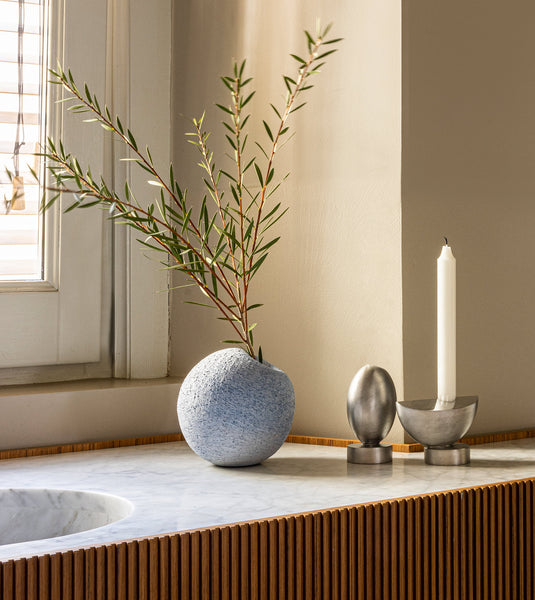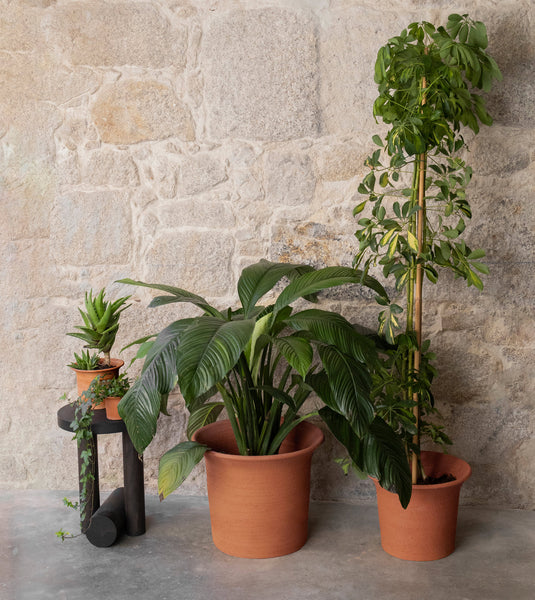Soulful Shapes: A Conversation with Master Potter João Lourenço
Lifestyle | Craft Stories
Soulful Shapes: A Conversation with Master Potter João Lourenço

January 19, 2024
By: Carolina Batalha and Jason Khoo
Cutting a grand figure hunched over his workbench as we enter his atelier in Barcelos, in the North of Portugal, João Lourenço finally rouses from his deep concentration when he notices us approaching and breaks into a wide smile. A ceramic artist, master potter and one of the few remaining craftspeople experienced in producing objects in the traditional technique of Barro Preto (black clay), João warmly welcomes us into the inner sanctum of his clay creations.

A man dedicated to his craft, João also makes objects in terracotta and Pasta Grés Chamotada, and often experiments with various glazing and firing techniques; he also regularly exhibits his handmade ceramics and pottery at local trade fairs. Radiating positivity and openness, João is the first craftsperson we collaborated with, and he fully embodies the spirit of Origin Made.
João's hands hold the secrets of a thousand pots. He is not just a potter; he is a storyteller, shaping tales of earth and fire into functional beauty. Carolina Batalha sits down for a chat with this endearing man to learn more about his passion for working with clay.

With a seasoned gaze reflecting decades of dedication, João traces the roots of his craft back to a time when pottery was more than an art form to him – it is a family legacy. Born into a lineage of potters, he vividly recalls childhood days spent in friendly competitions with siblings and cousins, moulding clay into shapes that hinted at the accomplished artist he would become.
If windows could look back into bygone days, and walls could speak, they would show and tell fine tales of pottery past; his atelier which used to be his family home, dates back to the mid-nineteenth century and was passed to him by his relative who inherited it from his grandfather who in turn inherited it from his great-grandfather.

While the memory of his very first creation may have faded with time, one piece remains etched in his mind – making 'test' lids for pots. This humble yet decidedly complex task for a beginner marked his initiation into the world of pottery. It was very much what he calls “learning through putting into action”. Lids have a very open form, almost like a kind of bowl, yet there needs to be precision to the evenness and the size for it to sit properly on the pot. And of course between young boys at that age, it was always a contest, to see “who could make a lid faster, the most beautiful, and to the point of being usable.”
Beyond the potter's wheel and clay-coated hands, we uncover the harmonious rhythm of João's creative process. With an eclectic taste in music ranging from classical to jazz, his studio becomes an orchestral space where pieces are shaped to the tune of inspiration. "I'm nearly always listening to music," João shares, emphasising the role of music in shaping the ambience of his potter’s den.

As we delve deeper into the intricacies of pottery, João unveils the intimate relationship between the potter and his tools. Crafted with care, these seemingly rudimentary tools for shaping clay hold great value to him. The width of a pinkie finger but three times the length, and a bit more pointed for some and more flattened for others depending on what he wants to create, each “tec”, the technical name for the stick, is made of boxwood, and he has at least two of them for more than twenty years. “They are like an extension of myself!”
“These sticks break, and I try to give them a second life, maybe a little more sandpaper on the one side. You see, these sticks adapt to the way I work, they wear out in a certain way, and over time one side works better. Can I buy new ones? Yes, but new sticks need to be broken in, to acquire the shape that I want. So, it's quite precious indeed, my worn out and overly used sticks. If one breaks, I would spend hours or even days making new ones, and usually, the first dozens of pieces don't quite get where I want them to. Hence, it's very dear to me, what looks like just a simple stick because it is a tool that fits. It's something very basic, very simple, but for me, who is working with it, it's not that simple.”
Essentially your hands are your most important tools, Carolina offers in response, noting that the potter's hands guide the creation process, each piece moulded by a combination of discipline, intuition, and experience. "Ah, well for pottery, what happens with the hands actually begins in the head,” rejoins João with a twinkle in his eyes.
He further shares that clay is fickle in a way, it doesn’t stay the same – clay dries, distorts, and moves in its own time. “Analysing a design and knowing how to start making each part of the final piece is a very important step of the process because it is necessary to figure out the dynamic ‘timings’ of clay; if one part hardens too much, then it would not stick to another.”

Responding to whether he has a favourite corner in his workshop, João furrows his brows, then thoughtfully reflects that he constantly has to inhabit different stations in the course of his day, from the wheel where vessels are formed, to the workbench where he makes pieces by hand, to the kilns; he is everywhere in his atelier. But to him, the kiln is a special place, his eyes glinting, and voice slightly rising in excitement as he shares that opening the kiln door and seeing the results is the most enchanting part.
“Even after all these years, after forty years working with ceramics, the kiln always holds surprises. Hence, there is always that eagerness, after a firing, or rather, the day after the firing, and opening the kiln and thinking, let’s see!”

To young potters, João offers not merely advice, but also a challenge. He dispels myths of poverty and dirt, reminding them that this is a job like any other, worthy of respect and passion. He speaks of the changing landscape, which has moved beyond just producing utilitarian pieces meant for the kitchen, and is heading towards more discerning tastes, and towards the more decorative. His is a call for young people to embrace the evolution in the industry, to find their creative voice in the ever-shifting landscape of ceramics.
"Don't be afraid to get dirty or experience breakages," he booms, a laugh erupting.

While João may not have a family heir to his craft, his children preferring to pursue other interests, his knowledge ripples outward. He welcomes eager hands into his studio, always ready to share his passion with a new generation.
As we leave, we carry not just João's story, but a piece of his spirit. He reminds us that life, like clay, can be moulded, shaped, and transformed with a touch of passion and a dash of patience. And in his hands, we witness the magic that happens when mud becomes more than just earth – it becomes art, it becomes a connection between people. And that is what we sincerely hope translates in every handcrafted piece from Origin Made.
Handcrafted Collectibles by João Lourenço:





